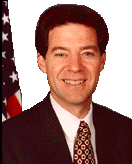|
Statement by Sen. Sam Brownback (R-KS).
Re: S 696 IS, the Third Generation Wireless
Internet Act.
Date: April 4, 2001.
Source: Congressional Record. |
|
 |
|
Mr. President, today I rise to reintroduce the Third Generation Wireless
Internet Act. This legislation, which I first introduced in the 106th Congress,
is needed today more then ever. The Act requires The Federal Communications
Commission (FCC) to lift the current cap on the amount of spectrum any one
company may be licensed to use in a market.
Today, over 104 million Americans are benefitting from the products and
services being offered by our nation's wireless industry. The public has
benefited from stiff competition among industry participants as 244.8 million
Americans can choose between three and eight wireless service providers, with
181.7 million of them able to choose from at least five service providers. The
result of this competition has been a fifty percent decrease in wireless rates
between 1988 and 2000, while the total number of minutes used has increased
forty-two percent over that same period.
Impressive as is the development of the wireless marketplace, our nation's
wireless industry is fast approaching a crossroads where it will transition from
voice and text messaging services to a marriage of wireless mobility with the
power of the Internet and broadband Internet access: the ability to deliver
voice, video, and data simultaneously over one wireless device. This transition
will be made possible by the deployment of third generation technology, commonly
referred to as ``3G,'' which combines wireless mobility with transmission speeds
and capacity resembling that of the broadband pipes being laid primarily in
urban markets by wireline companies.
Congress, the FCC, and the National Telecommunications and Information
Administration continue to work to identify sufficient spectrum resources for a
timely 3G deployment. The Third Generation Wireless Internet Act will ensure
that companies currently at the limits of the spectrum they are permitted to use
under FCC regulations will still be able to participate in 3G deployment once
the spectrum is identified.
Just as Internet access, especially broadband Internet access, promises to be
a great equalizer across socio-economic lines, 3G promises to be a great
equalizer between those consumers with access to broadband and those without. As
Congress continues to look for ways to close the digital divide as it relates to
broadband, wireless technology can play a key role in ensuring that all
Americans have access to broadband irrespective of their geographic location. It
is incumbent upon Congress to recognize and act upon the potential of 3G to
close the gap between urban and rural broadband access, and the Third Generation
Wireless Internet Act does just that.
|
